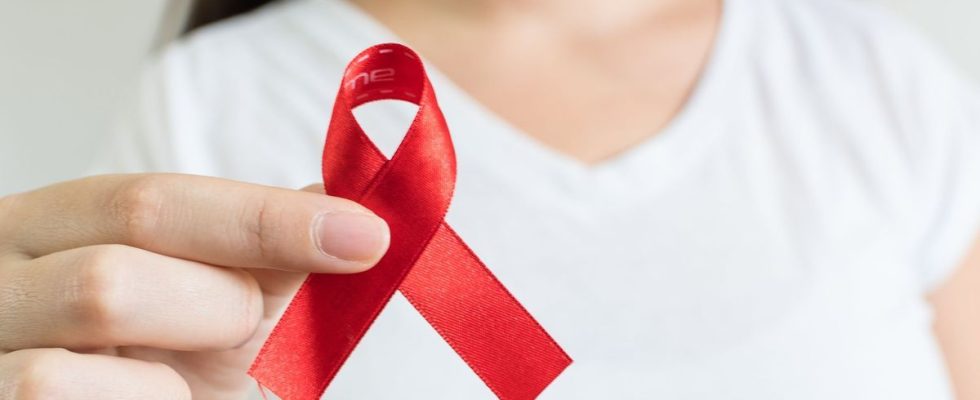Published on
Updated
Reading 4 mins.
A recent survey showed that a fifth of French people from generation Z still wrongly thought that it was possible to be infected with HIV by kissing an HIV-positive person. One received idea among others that associations are trying to sweep away to curb risky practices, but not only. It is also a question of putting an end to the rejection and discrimination suffered by HIV-positive people, as explained by Florence Thune, Managing Director of Sidaction, as the big annual fundraising weekend begins. Interview.
This Sidaction is marked by the 40th anniversary of the identification of HIV. Where are we in terms of new infections and therapeutic advances?
The latest available data show that around 1.5 million people were infected with HIV in 2021, well above the targets set by UNAIDS, which hoped to drop below 500,000 new infections in 2020. In France, just over 5,000 people discovered their HIV status in 2021, a stable figure compared to 2020, after the start of a decline in 2019. It is still too many, whether in France or in the world.
What we do know today, however, is that a person who discovers his HIV status will be able to access very quickly, at least in France, a treatment that will allow him to stay in good health. The treatments today are very effective. Taken regularly, they control the virus and prevent its replication in the body. Not only does the person remain healthy, but they can no longer transmit the virus, including during sex without a condom. The treatments have an extremely effective preventive effect. And new forms of treatment are now arriving to lighten the daily intake of medication, with injectable forms that must be administered every two months.
The catchphrase of the 2023 campaign is: “we have never been so close to enjoying a future without AIDS”. Can we already speak of a reality?
We can already say that we have never been so close, 40 years after discovering the virus. New prevention tools have emerged, PrEP in particular, and the treatments are very effective, preventing any development of the disease. People receiving treatment today will never become sick with AIDS, will not die from it, and will not transmit HIV. It is still necessary to be screened to access treatment. If, in theory, a world without AIDS could already be a reality thanks to the effectiveness of these treatments, we are not there yet. The current tools are not enough, we must persevere in the field of research to finally one day make the vaccine a reality, and develop treatments which, taken at once, will make it possible to definitively control HIV, in the absence of eradicate it.
What are the obstacles that still prevent us from seeing this future without AIDS?
We see this future, we know it is possible, but there are many obstacles. HIV testing, in France and around the world, has not returned to its pre-crisis level. The proportion of people who discover their seropositivity at an advanced stage of infection, or even at the AIDS stage, today amounts to almost 30% of new diagnoses. It’s way too much ! This means that not only have they seen their health deteriorate over the years, but they have also potentially infected other people, thus fueling a so-called ‘hidden’ epidemic.
More broadly, other obstacles have been identified: the non-delivery of three annual sexuality education sessions in schools, with the deterioration of young people’s knowledge of HIV, among other things. But also more social obstacles, sometimes of a political nature, which deteriorate the living conditions of people in great precariousness, exposing them to an increased risk of contamination by HIV, or of not having access to testing and care.
There are medical advances, and societal advances, with received ideas that still die hard. We know that those affected live better and longer, but what about the discrimination they face on a daily basis?
Science has evolved faster than mentalities, and people living with HIV continue to face rejection and discrimination. This may still be the case on an institutional level with, for example, laws still excluding these people from certain professions – military or gendarmes, for example – or preventing them from having access to work or residence permits in certain countries. . More generally, it is above all a matter of everyday discrimination, fueled by a lack of knowledge of scientific progress or by the persistence, generation after generation, of the fear of HIV-positive people. These fears are themselves fueled by a number of misconceptions, such as the belief that it is possible to become infected with HIV by kissing an HIV-positive person or by being in contact with their perspiration.
People can also suffer this rejection from members of the medical staff – refusal of care, inappropriate comments, ignorance of the latest developments and scientific evidence. The population aging with HIV is now faced with this type of situation in retirement homes or EHPADs, where it is again necessary to raise awareness and inform everyone of the fact that the support of an HIV-positive elderly person is in the same way as any other person, and this without any risk of contamination of course. Fears and fantasies around HIV and AIDS are tenacious, it will take more than a generation to get rid of them completely.
